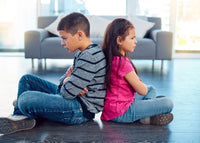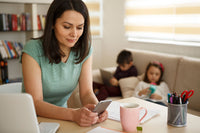By Michelle Mady
As summer winds down, stores start to display back-to-school supplies, Halloween candy makes its first appearances, and our schedules start to shift from a free-for-all summer to a strictly scheduled fall. There are a lot of emotions as we close in on the first day of school, from both children and their parents. But this year feels so different, as there are more children entering school who have never attended in-person learning before. This goes for preschoolers, kindergarteners, and even some first graders. So, how do we prepare them for, perhaps another, unprecedented school year?
There are a lot of emotions as we close in on the first day of school, from both children and their parents.
Routines
People love predictability, and children thrive on predictability. Routines offer a predictable security in a child’s day, especially when there are so many changes happening. Choose a few times that you can guarantee to keep consistent. Maybe it is the bedtime routine, dinner time prep, or breakfast set up. Let your child know what will and what won’t change so that even changes are predictable. Use visual schedules so that they can feel comfortable knowing what comes next. That also helps to curb the number of questions asked per day!
Materials
As parents, we get as excited and anxious about school starting as our children! We envision the perfect day, with the best first-day outfit and matching backpack. And as much as this picturesque day might be heartwarming, it doesn’t help prepare your child to return to school. Allowing them to choose their own outfit, backpack, folder, and lunchbox gives them some say in a situation that is otherwise out of their control.
Read A Book
Back-to-school books are made with so many favorite characters. Llama Llama, Knuffle Bunny, Elmo, Pete The Cat, Clark The Shark, Daniel Tiger and so many other characters are featured in school day stories. Although the story lines are good, the main point of each story is learning to love their new environment. Finding a character, animal, or person going through the same transition can help a child feel more secure. Reading these books together can also be an opportunity for your child to ask questions and for you to gain some insight about what they are excited or worried most about.
Act It Out
Remember those routines? Which ones are changing? Are mornings going to be busier, or maybe the opposite parent will now be in charge of getting ready in the mornings? Use a few weeks or days before school starts to practice those routines. Get up and ready at about the same time you would need to when school starts. Then, leave the house and take a walk around the block instead of to school. This helps the routine become more routine! Getting used to the changes over time can really help a child’s confidence as they embark on this new adventure.
Ask Questions
Reach out to your child’s new school and ask about their teachers. Ask about the schedule or routines of the classroom. Also ask questions about your child’s teacher. Not just about their credentials or experience. Ask about what the teachers enjoy or their favorite activities to do. Imagine if your child’s teacher loves to cook with the children and your child is a future Chopped star? Or maybe your child’s teacher has a dog, which is your child’s favorite animal. Finding ways to connect your child’s teacher as a friend to your child rather than another adult who is in charge, helps build the relationship before they even meet!
Keep Calm
Sending your child off to school for the first time can be nerve wracking. Will they like it, make friends, and learn something this year? Children literally absorb our emotions, and especially our anxiety. Focus on the good things about school. Speak well of the teacher and the upcoming experience. You may want to share that you are a little worried because it is new, but follow that up with how much fun all of the new toys will be! Allow them to feel how they are feeling about the transition: good, bad or otherwise. And support them with understanding, validation, and calm tones.
Starting a new school year can mean the end of time at home, but it is also the start of something big. Especially in the first few years after the pandemic, the social and emotional learning and development that children get in school before they start first grade is monumental. This is a time of change, but it is a time of creating building blocks and securing a well-rounded childhood.
Related read: "My Newfound Respect for Teachers"
-
About the author: Michelle is a mom of 5 children ranging in age from 5 to 15. As a toddler and preschool teacher, she shares experiences, activities and guidance to other parents, as both a parent and as a professional early childhood educator, at any stage of their parenting journey.
Photo credit: iStock.com/VioletaStoimenova




